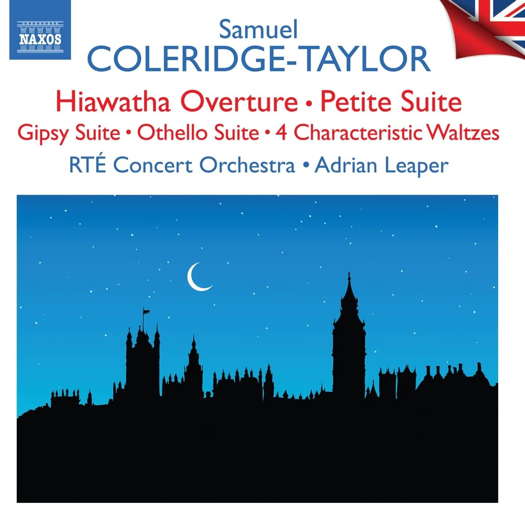- Peter Feuchtwanger
- de Falla
- Klose
- Lady Macbeth of Mtsensk
- Simon Callaghan
- Great American Songbook
- Jacques Cohen: Lancastria
- Richard Suart

Highly Romantic
GERALD FENECH listens to orchestral music by Samuel Coleridge-Taylor
'... this re-issue still sounds fresh and lively, credit to Adrian Leaper's advocacy for this fine music ...'
This fifth volume in Naxos' ongoing cycle dedicated to British light music focuses on a once popular composer whose life and work are as interesting as his music. Samuel Coleridge-Taylor was born on 15 August 1875 in London. His father was a Negro physician from Sierra Leone, West Africa, and his mother was an English woman. When the medical practice failed, his father returned to Africa, leaving young Samuel and his mother to fend for themselves. The boy's precarious upbringing did not stifle his love for music, and his violin studies progressed to the point where he was able to give his first public recital when only eight. He also sang as a choir boy in Croydon and, encouraged and helped by his choir master, he eventually entered the Royal College of Music in 1890. Initially he enrolled as a student of the violin, and in the same year his first important composition, a Te Deum, was published. In 1892 he began further studies in composition with Sir Charles V Stanford, subsequently winning a composition scholarship in March 1893.
Coleridge-Taylor completed his studies at the Royal College of Music in 1897, following which he won his first commission in 1898 from the Three Choirs Festival. Later that year, Stanford himself conducted the first performance of Hiawatha's Wedding Feast, the first part of the Hiawatha Trilogy after Longfellow's famous poem. From contemporary reports the performance does not appear to have gone very well, but public and critics alike were full of praise for the music. This success prompted a host of commissions from various music festivals, and the composer duly obliged by writing his Overture to The Song of Hiawatha and parts 2 and 3 of the trilogy, The Death of Minnehaha and Hiawatha's Departure.
During his relatively short life, Coleridge-Taylor was to become best known for his choral and vocal music, especially the Hiawatha Trilogy, but he was very active in other genres, especially symphonic and chamber. He was greatly respected as a man for his dignity and patience, as well as for his immense musical output. Not bad going for a man who only lived for thirty-seven years. Indeed, his demise on 1 September 1912 was a great loss for British music.
This exquisite collation of works opens, appropriately, with the Hiawatha Overture, Op 30 (1899). This highly romantic and exciting piece does not include any of the major tunes from the main composition, but can be regarded as an individual piece that, with its wonderful string writing, draws the listener into the heart of the story.
Listen — Samuel Coleridge-Taylor: Overture (The Song of Hiawatha)
(track 1, 5:55-6:54) ℗ 1995 Naxos Rights US Inc :
The Petite Suite de Concert, Op 77 (1910) is rightly regarded by many as a true masterpiece. The first movement, 'La Caprice de Nanette', has an impressive opening that quickly develops into a little waltz. 'Demande et réponse' has the strongest melody in the suite, reminiscent of the popular ballads of its day. 'Un Sonnet d'Amour' is a peaceful interlude before the 'Tarantella frétillante' explodes into a frisky finale.
Listen — Samuel Coleridge-Taylor: La Tarantelle frétillante (Petite Suite de Concert)
(track 5, 0:00-0:40) ℗ 1995 Naxos Rights US Inc :
The Four Characteristic Waltzes, Op 22 (1898), is a relatively early work and dates from the time when the composer was courting Jessie Walmisley, a fellow student, who later became his future wife with whom he had two children. He explained to her that he was not writing dance music, but rather treating the subjects in a waltz rhythm just like Brahms before him.
The Gypsy Suite, Op 20 (1897), originated as an instrumental work for violin and piano. Colourful and evocative, this four-movement suite was orchestrated by L Artock, and is just one of several similar commissions he undertook for the composer.
Romance of the Prairie Lillies, Op 39 (1899), is a 'dream poem' arranged by P E Fletcher. Like the Hiawatha Overture, it is packed with interesting ideas, many of them giving confirmation of the influence that the composer would exert on later generations of British composers of light music.
Listen — Samuel Coleridge-Taylor: Romance of the Prairie Lillies
(track 14, 5:42-6:29) ℗ 1995 Naxos Rights US Inc :
The Othello Suite, Op 79 (1909), was commissioned for a production of Shakespeare's play at His Majesty's Theatre in London. Originally comprising five movements - the Funeral March has been omitted from this recording, the work contains several strong and contrasting themes, which may have sounded more impressive in their original theatrical setting.
Initially recorded in January 1993 by Marco Polo, this re-issue still sounds fresh and lively, credit to Adrian Leaper's advocacy for this fine music, which, despite its melodious beauty, has somehow fallen out of fashion. Ask yourself, when did you last hear a Coleridge-Taylor piece? Hopefully this CD will set the record straight.
Copyright © 22 February 2022
Gerald Fenech,
Gzira, Malta

CD INFORMATION: SAMUEL COLERIDGE-TAYLOR




